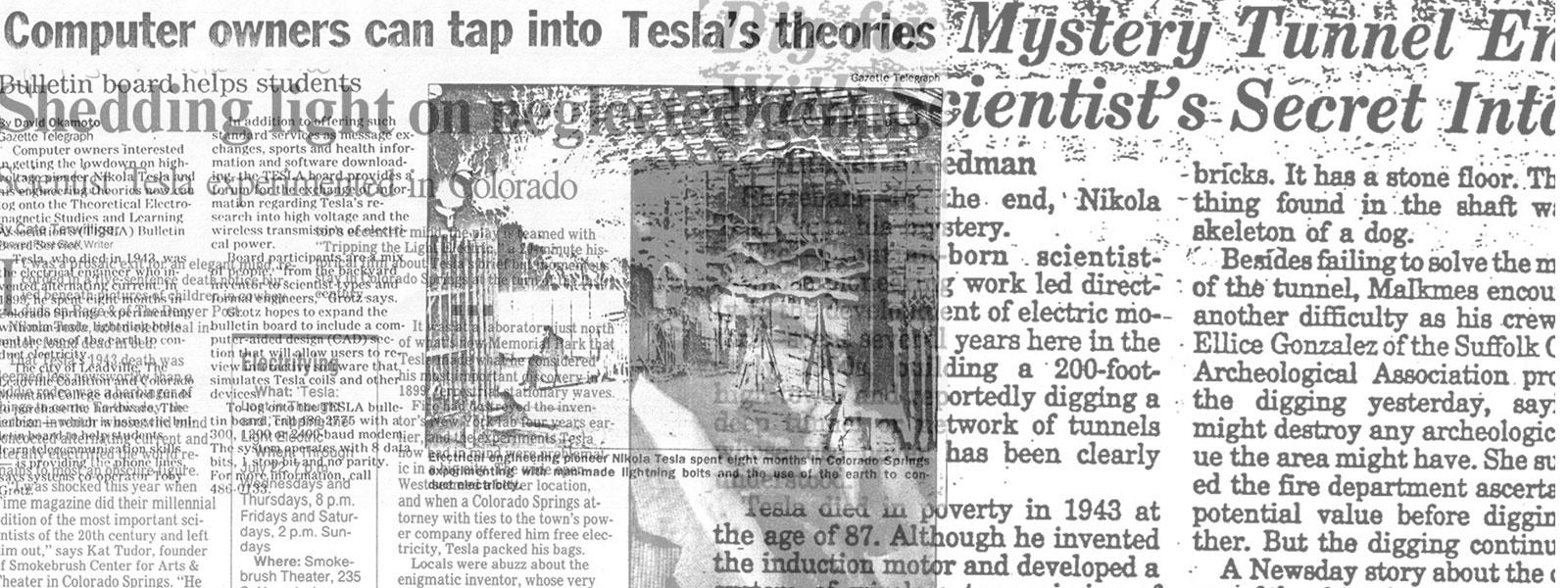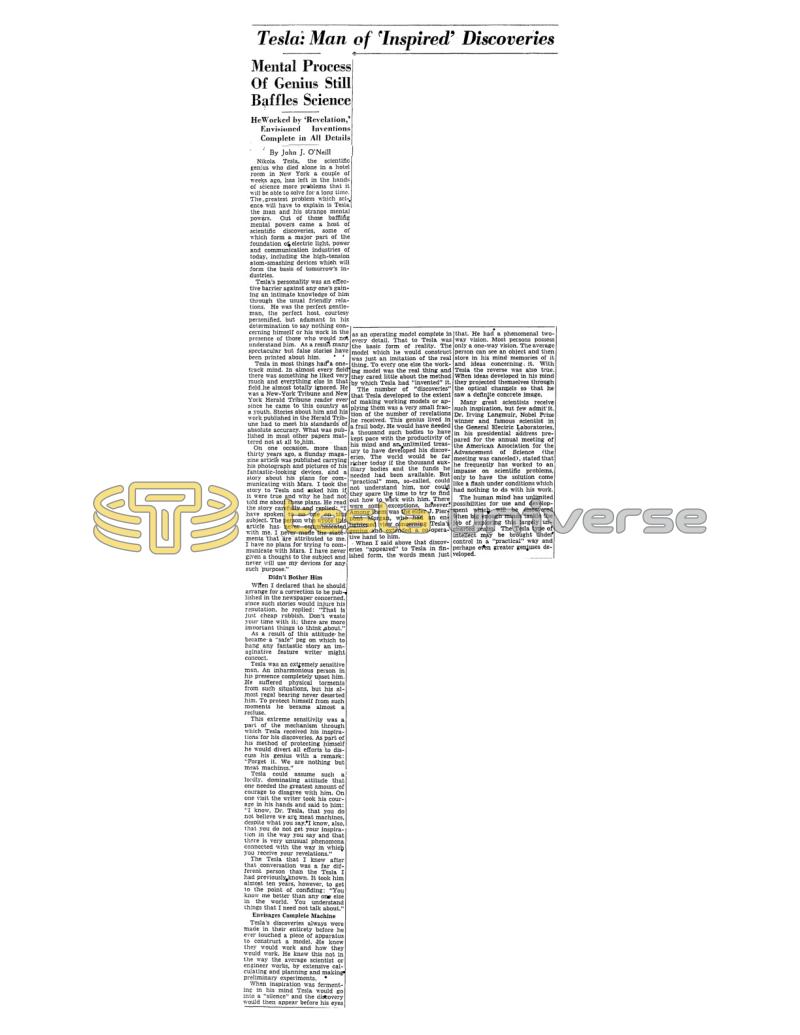
Nikola Tesla Articles
Tesla: Man of 'Inspired' Discoveries
Mental Process Of Genius Still Baffles Science
He Worked by 'Revelation,' Envisioned Inventions Complete in All Details
Nikola Tesla, the scientific, genius who died alone in a hotel room in New York a couple of weeks ago, has left in the hands of science more problems that it will be able to solve for a long time. The greatest problem which science will have to explain is Tesla the man and his strange mental powers. Out of those baffling mental powers came a host of scientific discoveries, some of which form a major part of the foundation of electric light, power and communication industries of today, including the high-tension atom-smashing devices which will form the basis of tomorrow's industries.
Tesla's personality was an effective barrier against any one's gaining an intimate knowledge of him through the usual friendly relations. He was the perfect gentleman, the perfect host, courtesy personified. but adamant in his determination to say nothing concerning himself or his work in the presence of those who would not understand him. As a result many spectacular but false stories have been printed about him.
Tesla in most things had a onetrack mind. In almost every field' there was something he liked very much and everything else in that field he almost totally ignored. He was a New-York Tribune and New York Herald Tribune reader ever since he came to this country as a youth. Stories about him and his work published in the Herald Tribune had to meet his standards of absolute accuracy. What was published in most other papers mattered not at all to him.
On one occasion, more than thirty years ago, a Sunday magazine article was published carrying his photograph and pictures of his fantastic-looking devices, and a story about his plans for communicating with Mars. I took the story to Tesla and asked him if it were true and why he had not told me about these plans. He read the story carefully and replied: "I have spoken to no one on this subject. The person who wrote this article has never communicated with me. I never made the statements that are attributed to me. I have no plans for trying to communicate with Mars. I have never given a thought to the subject and never will use my devices for any such purpose."
Didn't Bother Him
When I declared that he should arrange for a correction to be published in the newspaper concerned, since such stories would injure his reputation, he replied: "That is just cheap rubbish. Don't waste your time with it; there are more important things to think about."
As a result of this attitude he became a "safe" peg on which to hang any fantastic story an imaginative feature writer might concoct.
Tesla was an extremely sensitive man. An inharmonious person in his presence completely upset him. He suffered physical torments from such situations, but his almost regal bearing never deserted him. To protect himself from such moments he became almost a recluse.
This extreme sensitivity was a part of the mechanism through which Tesla received his inspirations for his discoveries. As part of his method of protecting himself he would divert all efforts to discuss his genius with a remark: "Forget it. We are nothing but meat machines."
Tesla could assume such a lordly, dominating attitude that one needed the greatest amount of courage to disagree with him. On one visit the writer took his courage in his hands and said to him: "I know, Dr. Tesla, that you do not believe we are meat machines, despite what you say. I know, also, that you do not get your inspira-] tion in the way you say and that there is very unusual phenomena connected with the way in which you receive your revelations."
The Tesla that I knew after that conversation was a far different person than the Tesla I had previously known. It took him almost ten years, however, to get to the point of confiding: "You know me better than any one else in the world. You understand things that I need not talk about."
Envisages Complete Machine
Tesla's discoveries always were made in their entirety before he ever touched a piece of apparatus to construct a model. He knew they would work and how they would work. He knew this not in the way the average scientist or engineer works, by extensive calculating and planning and making preliminary experiments.
When inspiration was fermenting in his mind Tesla would go into a "silence" and the discovery would then appear before his eyes as an operating model complete in. every detail. That to Tesla was the basic form of reality. The model which he would construct was just an imitation of the real thing. To every one else the working model was the real thing and they cared little about the method by which Tesla had "invented" it.
The number of "discoveries" that Tesla developed to the extent of making working models or applying them was a very small fraction of the number of revelations he received. This genius lived in a frail body. He would have needed a thousand such bodies to have kept pace with the productivity of his mind and an unlimited treasury to have developed his discoveries. The world would be far richer today if the thousand auxiliary bodies and the funds he needed had been available. But "practical" men, so-called, could not understand him, nor could they spare the time to try to find out how to work with him. There were some exceptions, however Among them was the elder J. Pierpont Morgan, who had an enlightened view concerning Tesla's genius and extended a co-operative hand to him.
When I said above that discoveries "appeared" to Tesla in finished form, the words mean just that. 'He had a phenomenal twoway vision. Most persons possess only a one-way vision. The average person can see an object and then store in his mind memories of it and ideas concerning. it. With Tesla the reverse was also trúe. When ideas developed in his mind they projected themselves through the optical channels so that he saw a definite concrete image.
Many great scientists receive such inspiration, but few admit it. Dr. Irving Langmuir, Nobel Prize winner and famous scientist in the General Electric Laboratories, in his presidential address prepared for the annual meeting of the American Association for the Advancement of Science (the) meeting was canceled), stated that he frequently has worked to an impasse on scientific problems, only to have the solution come like a flash under conditions which had nothing to do with his work.
The human mind has unlimited possibilities for use and development which will be discovered when big enough minds tackle the job of exploring this largely uncharted realm. The Tesla type of intellect may be brought under control in a "practical" way and perhaps even greater genjuses developed.
